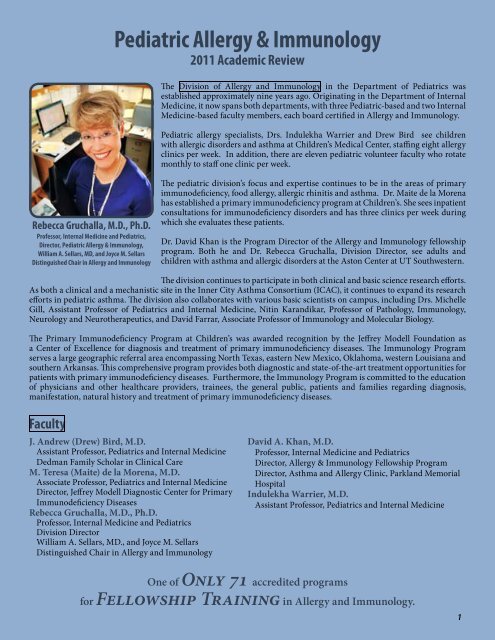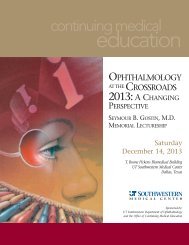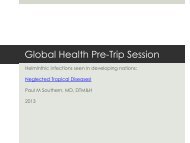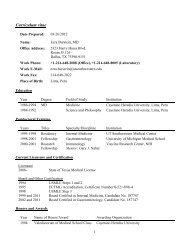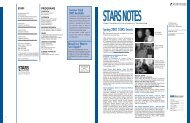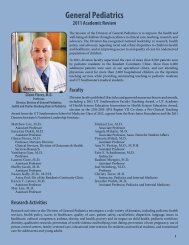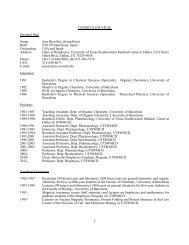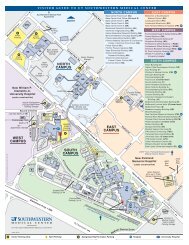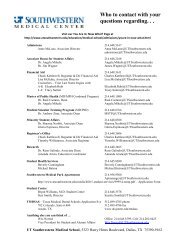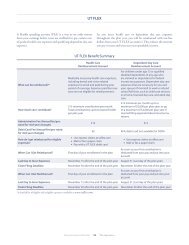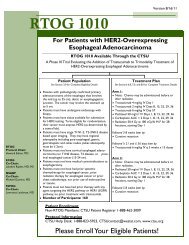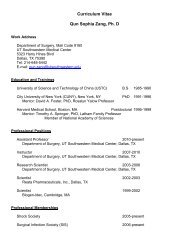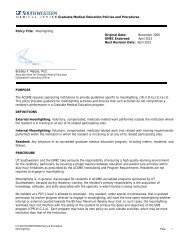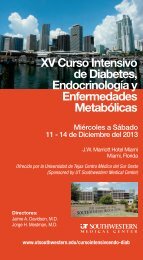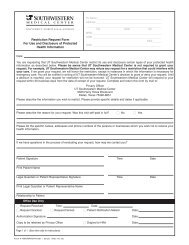Pediatric Allergy & Immunology - UT Southwestern
Pediatric Allergy & Immunology - UT Southwestern
Pediatric Allergy & Immunology - UT Southwestern
You also want an ePaper? Increase the reach of your titles
YUMPU automatically turns print PDFs into web optimized ePapers that Google loves.
<strong>Pediatric</strong> <strong>Allergy</strong> & <strong>Immunology</strong><br />
2011 Academic Review<br />
The Division of <strong>Allergy</strong> and <strong>Immunology</strong> in the Department of <strong>Pediatric</strong>s was<br />
established approximately nine years ago. Originating in the Department of Internal<br />
Medicine, it now spans both departments, with three <strong>Pediatric</strong>-based and two Internal<br />
Medicine-based faculty members, each board certified in <strong>Allergy</strong> and <strong>Immunology</strong>.<br />
<strong>Pediatric</strong> allergy specialists, Drs. Indulekha Warrier and Drew Bird see children<br />
with allergic disorders and asthma at Children’s Medical Center, staffing eight allergy<br />
clinics per week. In addition, there are eleven pediatric volunteer faculty who rotate<br />
monthly to staff one clinic per week.<br />
Rebecca Gruchalla, M.D., Ph.D.<br />
Professor, Internal Medicine and <strong>Pediatric</strong>s,<br />
Director, <strong>Pediatric</strong> <strong>Allergy</strong> & <strong>Immunology</strong>,<br />
William A. Sellars, MD, and Joyce M. Sellars<br />
Distinguished Chair in <strong>Allergy</strong> and <strong>Immunology</strong><br />
The pediatric division’s focus and expertise continues to be in the areas of primary<br />
immunodeficiency, food allergy, allergic rhinitis and asthma. Dr. Maite de la Morena<br />
has established a primary immunodeficiency program at Children’s. She sees inpatient<br />
consultations for immunodeficiency disorders and has three clinics per week during<br />
which she evaluates these patients.<br />
Dr. David Khan is the Program Director of the <strong>Allergy</strong> and <strong>Immunology</strong> fellowship<br />
program. Both he and Dr. Rebecca Gruchalla, Division Director, see adults and<br />
children with asthma and allergic disorders at the Aston Center at <strong>UT</strong> <strong>Southwestern</strong>.<br />
The division continues to participate in both clinical and basic science research efforts.<br />
As both a clinical and a mechanistic site in the Inner City Asthma Consortium (ICAC), it continues to expand its research<br />
efforts in pediatric asthma. The division also collaborates with various basic scientists on campus, including Drs. Michelle<br />
Gill, Assistant Professor of <strong>Pediatric</strong>s and Internal Medicine, Nitin Karandikar, Professor of Pathology, <strong>Immunology</strong>,<br />
Neurology and Neurotherapeutics, and David Farrar, Associate Professor of <strong>Immunology</strong> and Molecular Biology.<br />
The Primary Immunodeficiency Program at Children’s was awarded recognition by the Jeffrey Modell Foundation as<br />
a Center of Excellence for diagnosis and treatment of primary immunodeficiency diseases. The <strong>Immunology</strong> Program<br />
serves a large geographic referral area encompassing North Texas, eastern New Mexico, Oklahoma, western Louisiana and<br />
southern Arkansas. This comprehensive program provides both diagnostic and state-of-the-art treatment opportunities for<br />
patients with primary immunodeficiency diseases. Furthermore, the <strong>Immunology</strong> Program is committed to the education<br />
of physicians and other healthcare providers, trainees, the general public, patients and families regarding diagnosis,<br />
manifestation, natural history and treatment of primary immunodeficiency diseases.<br />
Faculty<br />
J. Andrew (Drew) Bird, M.D.<br />
Assistant Professor, <strong>Pediatric</strong>s and Internal Medicine<br />
Dedman Family Scholar in Clinical Care<br />
M. Teresa (Maite) de la Morena, M.D.<br />
Associate Professor, <strong>Pediatric</strong>s and Internal Medicine<br />
Director, Jeffrey Modell Diagnostic Center for Primary<br />
Immunodeficiency Diseases<br />
Rebecca Gruchalla, M.D., Ph.D.<br />
Professor, Internal Medicine and <strong>Pediatric</strong>s<br />
Division Director<br />
William A. Sellars, MD., and Joyce M. Sellars<br />
Distinguished Chair in <strong>Allergy</strong> and <strong>Immunology</strong><br />
David A. Khan, M.D.<br />
Professor, Internal Medicine and <strong>Pediatric</strong>s<br />
Director, <strong>Allergy</strong> & <strong>Immunology</strong> Fellowship Program<br />
Director, Asthma and <strong>Allergy</strong> Clinic, Parkland Memorial<br />
Hospital<br />
Indulekha Warrier, M.D.<br />
Assistant Professor, <strong>Pediatric</strong>s and Internal Medicine<br />
One of Only 71 accredited programs<br />
for Fellowship Training in <strong>Allergy</strong> and <strong>Immunology</strong>.<br />
1
Research Activities<br />
Under Dr. Gruchalla’s direction, the division continues to expand both its clinical and basic science research efforts in<br />
asthma. <strong>UT</strong> <strong>Southwestern</strong> was among 11 institutions selected by the National Institutes of Health to receive $56 million<br />
over five years as part of the Inner City Asthma Consortium (ICAC). The ICAC investigates novel treatments and causes<br />
of asthma in urban children. Ongoing studies include a<br />
prospective, longitudinal evaluation of environmental factors<br />
that influence the development of asthma.<br />
The consortium is administered by the University of Wisconsin-<br />
Madison. In addition to <strong>UT</strong> <strong>Southwestern</strong>, research is being<br />
conducted at:<br />
• Boston University,<br />
• Children’s Memorial Hospital in Chicago,<br />
• Children’s National Medical Center in Washington, D.C.,<br />
• Henry Ford Health System in Detroit,<br />
• National Jewish Health in Denver,<br />
• Johns Hopkins University in Baltimore,<br />
• Mount Sinai School of Medicine in New York,<br />
• St. Louis Children’s Hospital, and<br />
• University of California, San Francisco.<br />
In addition to three current studies, a very important trial funded by this consortium was published in March 2011 in the<br />
New England Journal of Medicine, co-authored by Dr. Gruchalla. The article, “Impact of the Addition of Omalizumab<br />
to Guidelines Based Therapy of Inner-City Asthma: A Randomized Controlled Trial,” found that a new anti-asthma<br />
medication, omalizumab, improved asthma control in the 419 children and young adults studied, nearly eliminated seasonal<br />
exacerbations of asthma, and reduced the need for controller medication when used in concert with NIH-based treatment<br />
guidelines. The study was a multi-institutional one involving <strong>UT</strong> <strong>Southwestern</strong> scientists and eight other academic medical<br />
institutions. In addition to the numerous ICAC clinical studies, ICAC-related basic research collaborations also are ongoing<br />
with <strong>UT</strong> <strong>Southwestern</strong> investigators, Drs. Michelle Gill, David Farrar and Nitin Karandikar.<br />
The Primary Immunodeficiency Program is engaged in both clinical and basic research. In collaboration with the Stem<br />
Cell Transplant at Children’s Medical Center, children with primary immunodeficiency diseases can be transplanted at<br />
our institution and are part of the Primary Immunodeficiency National Transplant Consortium (PIDTC). In terms of basic<br />
research, three areas of interest are as follows:<br />
1. To understand the molecular etiologies that may contribute to clinical heterogeneity in patients with primary<br />
immunodeficiency diseases. We are currently collaborating with Dr. Nicolai van Oers, Associate Professor of<br />
<strong>Immunology</strong>, Microbiology and <strong>Pediatric</strong>s at <strong>UT</strong> <strong>Southwestern</strong>, who has profiled the microRNA expression pattern in<br />
patients with Primary Immunodeficiency Diseases.<br />
2. To understand the long-term natural history of patients with X-linked hyper IgM syndrome. Dr. de la Morena has<br />
received funding through the Jeffrey Modell Foundation for this multinational collaborative study.<br />
3. To identify novel genes in primary immunodeficiency disease through exome sequencing. This project is done in<br />
collaboration with Dr. Ward Wakeland, Professor and Chairman of <strong>Immunology</strong> at <strong>UT</strong> <strong>Southwestern</strong>. The PIDs<br />
continue to provide unique opportunities to further our understanding of the biology of normal human immune<br />
function.<br />
Clinical Activities<br />
Asthma and <strong>Allergy</strong><br />
The Asthma and <strong>Allergy</strong> outpatient clinic is equipped to diagnose and manage the whole spectrum of allergic diseases. There<br />
are nine half day clinics per week to provide care for patients. An average of 200 patients are seen per month for evaluation<br />
and management of various atopic diseases, including, but not limited to, asthma, allergic rhinitis, atopic dermatitis, food<br />
allergy, insect sting allergy and drug allergy. Procedures such as skin prick testing for environmental and food allergens,<br />
hymenoptera venom allergy testing and testing for drug allergies are performed by trained personnel. Other services offered<br />
are immunotherapy - both traditional and rush - and anti-IgE immunoglobulin administration.<br />
2<br />
A Pulmonary Function Lab is available for spirometry as well as exhaled nitric oxide studies for the evaluation and<br />
management of patients with asthma. Providers work closely with educators from the Asthma Education and Asthma<br />
Management programs to provide a comprehensive management strategy for patients with severe asthma. Special procedures<br />
such as drug challenges and food challenges are also performed in the outpatient clinic.<br />
A combined <strong>Allergy</strong>/<strong>Immunology</strong> and Otolaryngology sinus clinic (CASCADE) has been established to provide<br />
comprehensive care for patients with chronic sinusitis. One half-day clinic per month is offered at both the Dallas and<br />
Legacy campus. To facilitate care, patients who are seen in these clinics have a complete evaluation of allergen sensitization<br />
patterns and immunological system, as well as an otolaryngological evauluation in one setting.<br />
A multidisciplinary High Risk asthma clinic was established in the summer of 2011 to provide comprehensive asthma care<br />
to patients with severe asthma and other co-morbid conditions. Two half-day clinics are offered at the Dallas campus where<br />
patients are evaluated by multiple providers including an allergist, pulmonologist, nutritionist, psychologist and asthma<br />
educators to provide comprehensive asthma care and education.<br />
An active inpatient consult service is available for evaluation of patients with allergic diseases. Consults are usually requested<br />
in cases of suspected drug-allergy, anaphylactic reactions and severe asthma.<br />
Food <strong>Allergy</strong><br />
In September of 2010, the Food <strong>Allergy</strong> Center (FAC) at Children’s, which is directed by Dr. Drew Bird, officially opened its<br />
doors. This multidisciplinary center, in association with <strong>UT</strong> <strong>Southwestern</strong>, is the only academically affiliated pediatric food<br />
allergy program in North Texas. As such, the Center provides comprehensive care for patients who have been diagnosed<br />
with food allergies and conducts research that is instrumental in developing treatments, therapies and, ultimately, a cure for<br />
food allergies. Its staff also works tirelessly throughout the region to educate parents, healthcare providers, school personnel<br />
and community stakeholders to help children and families navigate the many challenges associated with this complex<br />
health issue.<br />
In 2011, the FAC continued to expand its influence within North Texas. Highlights from the year include the following:<br />
Clinical Care<br />
• Nearly 1,000 clinic visits were conducted.<br />
• 134 food challenges were performed with assistance from Maria Crain,<br />
PNP. The food challenge process entails giving the child incremental<br />
doses of a particular food over one hour and monitoring the child for an<br />
additional period of time. If the child can tolerate a full serving of the<br />
potentially allergenic food without having an allergic reaction, the food<br />
may be introduced into the child’s diet.<br />
Research<br />
• A total of 12 children are currently enrolled in a peanut oral immunotherapy<br />
trial aimed at understanding how the immune system develops tolerance to<br />
peanut in peanut allergic children receiving therapy.<br />
• Two multi-center trials examining the safety of giving the flu vaccine to a<br />
child with an egg allergy. The influenza vaccine contains a small amount of<br />
egg protein, and, as such, is administered cautiously to children with egg<br />
allergies.<br />
• Investigating changes in the quality of life for families dealing with food<br />
Dr. Drew Bird<br />
Director, Food <strong>Allergy</strong> Center<br />
allergies who attend instructional cooking classes. This study seeks to better understand how cooking classes offered<br />
through our Center by a registered dietitian improve the quality of life for children affected by food allergies.<br />
• More than 100 families have participated in our interactive nut identification quiz. The goal of this study is to provide<br />
insight into the ability of those with tree nut allergies to accurately identify the nuts to which they are allergic, as well<br />
as those to which they are not.<br />
Advocacy and Education<br />
• One of the first overnight camps specifically for children with food allergies was hosted at Camp Sweeney in Gainesville,<br />
Texas. Thirty-five children attended camp where safe meals were prepared avoiding a cumulative total of more than 30<br />
different allergens.<br />
• The second annual Food <strong>Allergy</strong> Collaborative hosted Wesley Burks, M.D., Kiser-Arena Professor and Chief of the<br />
Division of <strong>Pediatric</strong> <strong>Allergy</strong> and <strong>Immunology</strong> at Duke University Medical Center in Durham, North Carolina, and an<br />
3
international food allergy expert. More than 100 attendees heard from Dr. Burks and Dr. Bird. The event was hosted<br />
by Children’s in conjunction with the Food <strong>Allergy</strong> Initiative in an effort to raise food allergy awareness and research<br />
support.<br />
• FAC nurses addressed several audiences eager to receive more guidance on handling food allergies. The Dallas<br />
Association of Parent Education learned from an FAC Nurse about the basic pathophysiology of a food allergy reaction,<br />
along with a review of the most current food allergy statistics.<br />
• The Food <strong>Allergy</strong> Center partnered with Whole Foods Market to conduct themed instructional cooking classes for<br />
parents dealing with food allergies. This class is open to the community and provides inspirational ideas on how to<br />
handle different situations such as back-to-school lunches and snacks, holiday time and quick dinner meals all avoiding<br />
the top eight allergens.<br />
• The FAC participated in Children’s Red Balloon Run and Relay, produced in partnership with Passion for Children’s. The<br />
Food <strong>Allergy</strong> Family Experience Council spearheaded the efforts to include their close family and friends to support the<br />
advocacy of food allergy. More than $3,000 was raised and all profits made from the run will go towards scholarships<br />
for Food <strong>Allergy</strong> Camp 2012.<br />
• The Food <strong>Allergy</strong> and Anaphylaxis Network is the world leader in food allergy information, resources and programs.<br />
Dr. Bird was named the Honorary Medical Walk Chair for the Dallas Food <strong>Allergy</strong> and Anaphylaxis Network Walk.<br />
• A panel discussion was held at Region X for parents with children struggling with food allergies going back to school.<br />
The panel consisted of experts from the FAC informing parents how to keep their children safe at school and providing<br />
guidance for effective communication to school personnel.<br />
<strong>Immunology</strong><br />
Clinical Care<br />
• Directed by Dr. Maite de la Morena, the <strong>Immunology</strong> Outpatient Clinic<br />
at Children’s serves as a referral center for primary immunodeficiency<br />
diseases for North Texas, southern Oklahoma, Arkansas, Louisiana and<br />
New Mexico. Patients with recurrent, persistent or unusual infections are<br />
evaluated for an inherited disorder of immune function. The clinic has<br />
expertise for management of all established primary immunodeficiency<br />
disorders (>155 disorders currently recognized). Referrals for periodic<br />
fever syndromes and evaluations for immunosuppressed states post<br />
transplantations also are seen in clinics.<br />
• Assisted by Erin Orwat, RN, more than 600 patients are seen per year.<br />
The <strong>Immunology</strong> program currently follows more than 200 patients with<br />
established primary immunodeficiency diseases. Around 50 patients are<br />
receiving infusions of gammaglobulin regularly. Inpatient consultation<br />
services for evaluation of immunodeficiency are available seven days a week.<br />
• In collaboration with the Stem Cell Transplant Program at Children’s,<br />
children with primary immunodeficiency diseases can be transplanted at<br />
our institution. This provides a unique collaboration between transplanters<br />
and immunologists. Diseases that have been transplanted include: SCID,<br />
X-hyper IgM, Wiskott Aldrich syndrome, Chronic Granulomatous Disease,<br />
Interferon Gamma defect, Chediak-Higashi syndrome, and Hemophagocytic Lymphohistiocytosis.<br />
Dr. Maite de la Morena<br />
Director, <strong>Immunology</strong> Outpatient Clinic<br />
Research<br />
• MicroRNA in PID: We are currently analyzing the microRNA profile of patients with Primary Immunodeficiency<br />
Disease. Despite the known relevance of microRNA for the development and functioning of the immune system, little<br />
is known about changes in their expression in patients with PID. An R21 funded project has allowed for the analysis of<br />
71 patients with established immunodeficiency. This study is performed in collaboration with Dr. Nicolai van Oers at<br />
<strong>UT</strong>SW. Publications from such analysis are currently submitted for publication.<br />
• Identification of novel genes in patients with primary immunodeficiency diseases through exome sequencing. A total<br />
of six families are participating in the analysis of rare immunodeficiency phenotypes in which a molecular diagnosis<br />
is unknown. This analysis is currently being performed in collaboration with Dr. Ward Wakeland and Dr. Nicolai van<br />
Oers, Associate Professor of <strong>Immunology</strong>, Microbiology and <strong>Pediatric</strong>s at <strong>UT</strong> <strong>Southwestern</strong>.<br />
• The United States Immunodeficiency Network, (USIDNET) is a National Registry for patient with established<br />
immunodeficiency diseases. USIDNET, a program of the Immune Deficiency Foundation (IDF), is funded in part<br />
by the National Institute of <strong>Allergy</strong> and Infectious Diseases (NIAID) and the National Institutes of Health (NIH), an<br />
agency of the Department of Health & Human Services.<br />
• Long-term outcomes in patients with X-Linked hyper IgM syndrome. (Pending IRB approval)<br />
4<br />
Advocacy and Education<br />
• On October 30, 2011 faculty, nursing and administrative staff got together with PID patients and their families to<br />
celebrate the 4 th annual Kids Day event at the Dallas Zoo. Close to 200 people participated in this gathering which is<br />
sponsored by the Jeffrey Modell Foundation.<br />
Education and Training<br />
The <strong>Allergy</strong> and <strong>Immunology</strong> division provides the major instruction to pediatric residents in the evaluation and<br />
management of children with allergic diseases, asthma and immunodeficiency diseases. It also provides didactic teaching<br />
for the pediatric residents on the basics of allergy and immunology and directs teaching for the pediatric residents in the<br />
regular departmental clinical conferences and as part of the inpatient consultation service.<br />
<strong>Pediatric</strong> residents see outpatients in our clinics under the supervision of one of the members of the division faculty. Relevant<br />
articles about specific allergic and immunologic disorders are provided to residents at the beginning of each rotation, and<br />
residents attend clinical conferences offering didactic teaching for fellows.<br />
An <strong>Allergy</strong> and <strong>Immunology</strong> elective is available for pediatric residents and fourth-year medical students. The objectives of<br />
the elective are to:<br />
• Develop a working differential diagnosis of allergies, asthma and primary immunodeficiencies;<br />
• Learn how to conduct a complete physical exam, including the upper and lower airways;<br />
• Examine and discuss patients from all major allergy and immunology categories: allergic rhinitis, asthma, urticaria, drug<br />
allergy, food allergy and primary immunodeficiency.<br />
In addition to medical student and resident training, the division has one of only 71 accredited programs for fellowship<br />
training in <strong>Allergy</strong> and <strong>Immunology</strong>; Dr. David Khan is the Program Director. The <strong>Allergy</strong>/<strong>Immunology</strong> (A&I) fellowship<br />
training program continues to train high-quality A&I specialists. Our view is that successful training in allergy and<br />
immunology should consist of balanced exposure to training experiences involving adults and children, no matter what the<br />
training background or the long-term plans of any particular fellow-in-training. Drs. Rebecca Gruchalla and David Khan,<br />
the program director, oversee the adult teaching clinics at Parkland, while Drs. Maite de la Morena, Indulekha Warrier<br />
and Drew Bird oversee the teaching clinics at Children’s. Further staffing of both adult and pediatric clinics is provided by<br />
our 29 volunteer-clinical faculty members. Approximately 40 percent of A&I fellows have come from pediatric house staff<br />
programs, and approximately half of the outpatient clinics attended by A&I fellows occur at Children’s.<br />
Presentations/Teaching Activities<br />
Rebecca Gruchalla, M.D., Ph.D.<br />
• “Inner-city mold exposure and inner-city asthma, Workshop: Inner-city Allergens as Causes and Exacerbations of<br />
Asthma, American Academy of <strong>Allergy</strong>, Asthma and <strong>Immunology</strong> Annual Meeting, San Francisco, March 2011<br />
J. Andrew Bird, M.D.<br />
• “Food Allergies in Children,” Current Trends in Family Medicine CME Conference, <strong>UT</strong> Health Science Center, Tyler,<br />
TX, February 2011<br />
• “Update on Oral Desensitization and Tolerance,” 13 th Annual Texas <strong>Allergy</strong>, Asthma and <strong>Immunology</strong> Society<br />
(TAAIS), <strong>Allergy</strong> for the Allergist, Houston, TX, May 2011<br />
• “Review of the Diagnostic Guidelines for the Diagnosis and Management of Food <strong>Allergy</strong>,” Florida Dietetic<br />
Association, Fort Lauderdale, FL, July 2011<br />
• “Diagnosis and Management of Food <strong>Allergy</strong>,” <strong>Pediatric</strong> Grand Rounds, <strong>UT</strong> <strong>Southwestern</strong>, October 2011<br />
• “Food <strong>Allergy</strong>, Oral Food Challenges, and Vaccines,” American College of <strong>Allergy</strong>, Asthma and <strong>Immunology</strong> Annual<br />
Meeting, Boston, MA, November 2011<br />
M. Teresa (Maite) de la Morena, M.D.<br />
• “Primary Immunodeficiency Diseases,” Dallas Internist Club, Dallas, TX, March 2011<br />
• “Management Strategies and Outcomes for CD40Ligand,” Primary Immune Deficiency Treatment Consortium<br />
(PIDTC) Meeting, San Francisco, CA, April 2011<br />
• “Recurrent Candidiasis: Lessons from Primary Immunodeficiency Diseases,” <strong>Allergy</strong>/<strong>Immunology</strong> Grand Rounds,<br />
Presbyterian Hospital, Dallas, TX, May 2011<br />
David A. Khan, M.D.<br />
• “Management of the Drug Allergic Patient: Utilizing Ancient Techniques in the 21 st Century,” <strong>Allergy</strong> & <strong>Immunology</strong><br />
Grand Rounds, National Institute of Health (NIH), Bethesda, MD, February 2011<br />
• “Difficult Drug <strong>Allergy</strong> Cases,” American Academy of <strong>Allergy</strong>, Asthma and <strong>Immunology</strong> Annual Meeting, San<br />
Francisco, CA, March 2011<br />
5
• “Chronic Urticaria and Angioedema: Difficult Cases,” Allied Health<br />
Workshop, American Academy of <strong>Allergy</strong>, Asthma and <strong>Immunology</strong><br />
Annual Meeting, San Francisco, CA, March 2011<br />
• “Drug Challenges: Indications, Procedures, Risk and Safety Outcomes,”<br />
American Academy of <strong>Allergy</strong>, Asthma and <strong>Immunology</strong> Annual<br />
Meeting, San Francisco, CA, March 2011<br />
• “Injectable Epinephrine Should be Prescribed for All Patients Receiving<br />
<strong>Allergy</strong> Immunotherapy (Con)”, Pro/Con Debate, American Academy of<br />
<strong>Allergy</strong>, Asthma and <strong>Immunology</strong> Annual Meeting, San Francisco, CA,<br />
March 2011<br />
• “Management of the Drug Allergic Patient: Utilizing Ancient Techniques<br />
in the 21 st Century,” Illinois <strong>Allergy</strong> Society, Chicago, IL, April 2011<br />
(invited lecturer)<br />
• “Urticaria: Updates From the Upcoming Practice Parameter” and<br />
“Exercise-Induced bronchospasm: Burden and Prevalence,” Eastern<br />
<strong>Allergy</strong> Conference, Palm Beach, FL, June 2011<br />
• “Cutaneous Drug Reaction’s” and “Diagnostic Testing in Drug <strong>Allergy</strong>,”<br />
Louisiana State <strong>Allergy</strong> & <strong>Immunology</strong> Society, New Orleans, LA, June<br />
2011<br />
• “Management of Refractory Chronic Urticaria,” <strong>Allergy</strong> & <strong>Immunology</strong><br />
Grand Rounds, Wilford Hall Medical Center, San Antonio, TX, June<br />
Drs. Rebecca Gruchalla and Michelle Gill<br />
2011<br />
• “Management of the Drug Allergic Patient: Utilizing Ancient Techniques in the 21 st Century,” Internal Medicine<br />
Grand Rounds, St Louis University, St Louis, MO, August 2011<br />
• “Induction of Drug Tolerance Procedures: Patient Selection, Choosing a Protocol and Safety Considerations” and<br />
“Diagnostic Testing in Drug <strong>Allergy</strong>: Beyond Penicillin Skin Tests,” Kaiser Permanente <strong>Allergy</strong> & <strong>Immunology</strong><br />
Annual Meeting, Berkeley CA, September 2011<br />
• “Asthma Management: Beyond The Lungs,” Northwest <strong>Allergy</strong> & Asthma Nurses Association Annual Meeting,<br />
Redmond, OR, October 2011<br />
• “Approach to the Patient with Refractory Chronic Urticaria,” Boston City-Wide <strong>Allergy</strong> & <strong>Immunology</strong> Rounds,<br />
Boston MA, October 2011 (invited lecture)<br />
• “Basic <strong>Immunology</strong> and Genetics: Literature Review,” American College of Asthma, <strong>Allergy</strong> and <strong>Immunology</strong><br />
Annual Meeting, Boston MA, November 2011<br />
• The Great Chronic Idiopathic Urticaria Raft Debate: After Antihistamines, What’s Best For Next In Line Treatment:<br />
Hydroxychloroquine and Dapsone,” American College of Asthma, <strong>Allergy</strong> and <strong>Immunology</strong> Annual Meeting,<br />
Boston, MA, November 2011<br />
• “Drug Challenges: Easing the Fear of Graded Dose Challenges,” American College of Asthma, <strong>Allergy</strong> and<br />
<strong>Immunology</strong> Annual Meeting, Boston, MA, November 2011<br />
• “Adverse Drug Reactions and Managements: Antibiotics,” “Betalactam Reactions: Desensitizations” and “Drug<br />
<strong>Allergy</strong> Testing and Desensitization: Non-betalactam Antibiotics,” World <strong>Allergy</strong> Congress Annual Meeting, Cancun<br />
Mexico, December 2011<br />
Awards and Honors<br />
J. Andrew (Drew) Bird, M.D.<br />
• Best <strong>Pediatric</strong> Specialists in Dallas, D Magazine<br />
• National Institutes of Health <strong>Pediatric</strong> Loan Repayment Program Award (2010–2012)<br />
Rebecca Gruchalla, M.D., Ph.D.<br />
• Best <strong>Pediatric</strong> Specialists in Dallas, D Magazine<br />
• Top US Doctors, U.S. News & World Report<br />
David Khan, M.D.<br />
• Top US Doctors, U.S. News & World Report<br />
M. Teresa (Maite) de la Morena, M.D.<br />
• Best <strong>Pediatric</strong> Specialists in Dallas, D Magazine<br />
Publications<br />
Articles<br />
1. Alvares ML, Khan DA. Allergic rhinitis with negative skin tests. Curr <strong>Allergy</strong> Asthma Rep;11:107-14.<br />
2. Belkaya S, Silge RL, Hoover AR, Medeiros JJ, Eitson JL, Becker AM, de la Morena MT, et al. Dynamic modulation of<br />
thymic microRNAs in response to stress. PLoS One;6:e27580.<br />
3. Bird JA, Abramson S. Roundtable Discussion: <strong>Pediatric</strong> Asthma and <strong>Allergy</strong>. Journal of Asthma & <strong>Allergy</strong> Educators<br />
2011;2(5):253-4.<br />
4. Bird JA, Kulis M, Kamilaris N, et al. Effect of Peanut Oral Immunotherapy (OIT) on Other Food Allergen-Specific IgE<br />
Levels J <strong>Allergy</strong> Clin Immunol 2011;127(2):AB25.<br />
5. Busse WW, Morgan WJ, Gergen PJ, Mitchell HE, Gern JE, Liu AH, Gruchalla RS, et al. Randomized trial of omalizumab<br />
(anti-IgE) for asthma in inner-city children. N Engl J Med;364:1005-15.<br />
6. Chin SJ, Kim EH, Bird JA, et al. Basophil Suppression in Peanut Allergic Patients Undergoing Sublingual Immunotherapy<br />
(SLIT). J <strong>Allergy</strong> Clin Immunol 2011;127(2):AB28.<br />
7. Cox L, Nelson H, Lockey R, Calabria C, Chacko T, Finegold I, Nelson M, Weber R, Bernstein DI, Blessing-Moore J, Khan<br />
DA, et al. Allergen immunotherapy: a practice parameter third update. J <strong>Allergy</strong> Clin Immunol;127:S1-55.<br />
8. Davis LS, Bhutani S, Barnett SR, Khan DA. Early gene expression changes with rush immunotherapy. Clin Mol<br />
<strong>Allergy</strong>;9:12.<br />
9. de la Morena MT, Gatti RA. A history of bone marrow transplantation. Hematol Oncol Clin North Am;25:1-15.<br />
10. Golden DB, Moffitt J, Nicklas RA, Freeman T, Graft DF, Reisman RE, Tracy JM, Bernstein D, Blessing-Moore J, Cox L,<br />
Khan DA, et al. Stinging insect hypersensitivity: a practice parameter update 2011. J <strong>Allergy</strong> Clin Immunol;127:852-4<br />
e1-23.<br />
11. Greenhawt MJ, Li JT, Bernstein DI, Blessing-Moore J, Cox L, Khan D, et al. Administering influenza vaccine to egg<br />
allergic recipients: a focused practice parameter update. Ann <strong>Allergy</strong> Asthma Immunol;106(1):11-6.<br />
12. Gruchalla RS. Inner-city asthma: control can be achieved! J <strong>Allergy</strong> Clin Immunol;128:64-5.<br />
13. Kavosh ER, Khan DA. Second-generation H1-antihistamines in chronic urticaria: an evidence-based review. Am J Clin<br />
Dermatol;12:361-76.<br />
14. Khan DA. Hereditary angioedema: Historical aspects, classification, pathophysiology, clinical presentation, and<br />
laboratory diagnosis. <strong>Allergy</strong> Asthma Proc;32:1-10.<br />
15. Kim EH, Bird JA, Kulis M, et al. Sublingual immunotherapy for peanut allergy: clinical and immunologic evidence of<br />
desensitization. J <strong>Allergy</strong> Clin Immunol;127:640-6 e1.<br />
16. Kim EH, Bird JA, Kulis M, et al. Evidence of Desensitization by Sublingual Immunotherapy in Peanut-Allergic Children.<br />
J <strong>Allergy</strong> Clin Immunol 2011;127(2):AB72.<br />
17. Paranjpe P, Schull D, Bird JA. Assessing the Impact of an Educational Intervention Upon the Quality of Life of Food<br />
Allergic Children. J <strong>Allergy</strong> Clin Immunol 2011;127(2):AB111.<br />
18. Webb L, Petersen M, Boden S, LaBelle V, Bird JA, et al. Single-dose influenza vaccination of patients with egg allergy in<br />
a multicenter study. J <strong>Allergy</strong> Clin Immunol;128:218-9.<br />
Book Sections<br />
1. De la Morena MT. Congenital Immunodeficiencies. In: Fuhrman P, Zimmerman J, eds. <strong>Pediatric</strong> Critical Care. 4th ed.<br />
Philadelphia: Elsevier Saunders; 2011.<br />
Grants<br />
Non-governmental Organization Grants and Contracts<br />
M. Teresa (Maite) de la Morena, M.D.<br />
Natural History Study of Long Term outcomes of patients with X-linked Hyper IgM Syndrome<br />
Jeffrey Modell Foundation Inc.<br />
09/15/11 - 09/15/13<br />
J. Andrew (Drew) Bird, M.D.<br />
Peanut Oral Immunotherapy for Treatment of Peanut <strong>Allergy</strong><br />
Dedman Family Scholar in Clinical Care<br />
01/01/09 - Present<br />
6 7


